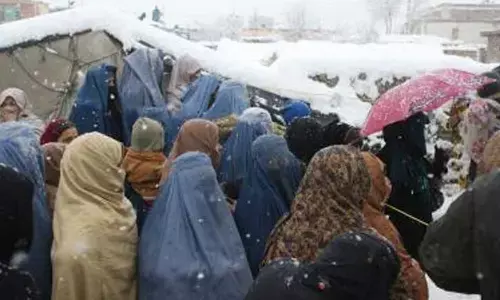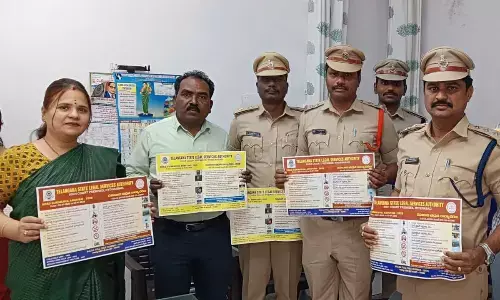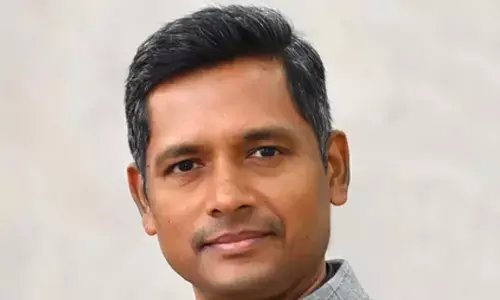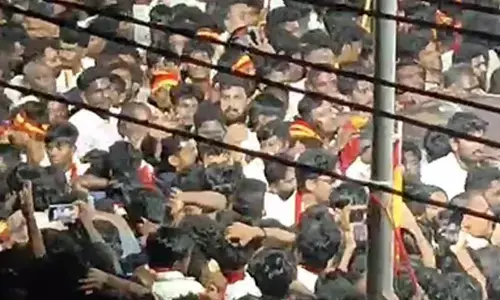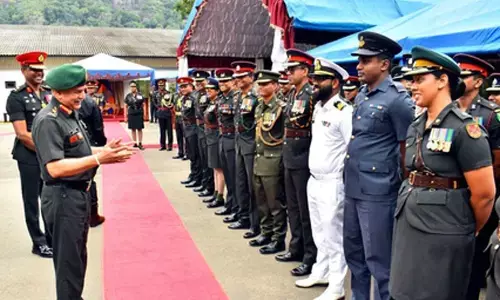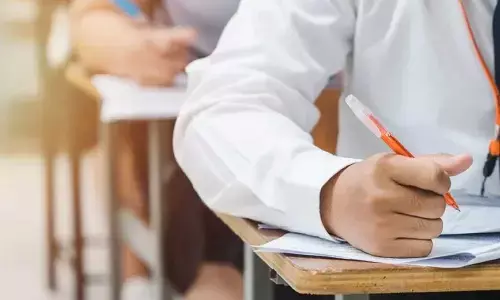Will video court render open justice?
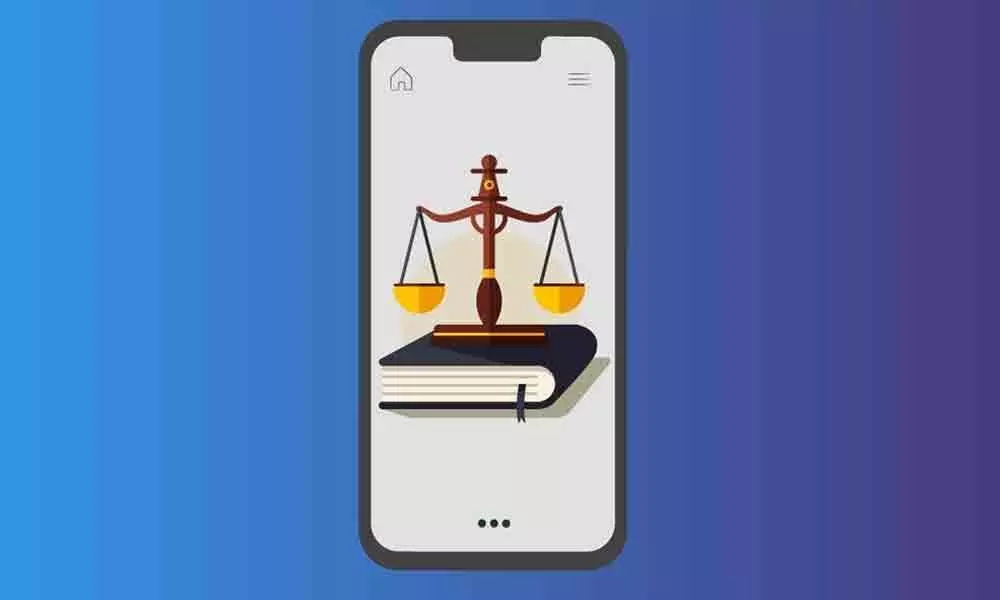 Madabhushi piece
Madabhushi pieceOn May 3, the Supreme Court, in 38-page note, strongly defended its "virtual courts system", as that was needed to ensure the "administration of justice" does not crumble in the face of a pandemic.
Referring to almost 23 countries like the USA, the UK and France, the SC said many nations have been using the virtual courts system, but India has been ahead in terms of the output. "Information available on court and other judicial websites would indicate that in nations hit hard by the Covid-19 pandemic like the USA, UK, EU, France, Italy, Germany, China, Canada, Australia, Singapore etc, judicial organs of the state carrying out administration of justice are mostly relying on virtual court methodologies and online case-management in place in their respective jurisdictions," it said. While 60-day- lockdown rigour being relaxed, justice remained a non-essential service! Supreme Court and High Courts are hearing some urgent cases through video conferencing. District and subordinate courts are mostly locked down. Regular justice is locked down. Can it be replaced with virtual court? Is virtual court equal to real public hearing?
On May 3, the Supreme Court, in 38-page note, strongly defended its "virtual courts system", as that was needed to ensure the "administration of justice" does not crumble in the face of a pandemic. The advantages of the Virtual Court System, especially in terms of time, energy and money saved by the litigants and counsels in ensuring their presence before a court are innumerable and could be game-changers too," it said.
Referring to almost 23 countries like the USA, the UK and France, the SC said many nations have been using the virtual courts system, but India has been ahead in terms of the output. "Information available on court and other judicial websites would indicate that in nations hit hard by the Covid-19 pandemic like the USA, UK, EU, France, Italy, Germany, China, Canada, Australia, Singapore etc, judicial organs of the state carrying out administration of justice are mostly relying on virtual court methodologies and online case-management in place in their respective jurisdictions," it said.
While 60-day- lockdown rigour being relaxed, justice remained a non-essential service! Supreme Court and High Courts are hearing some urgent cases through video conferencing. District and subordinate courts are mostly locked down. Regular justice is locked down. Can it be replaced with virtual court? Is virtual court equal to real public hearing?
SC does not allow recording or broadcast
Many advocates are not comfortable with e-filing. The SC directed the helpline of 1881 to be functional to help advocates in e-filing and virtual hearing. However, the proceedings by video conferencing is not allowed to be recorded or stored or broadcast, in any manner whatsoever, as recording/copying/ storing and/or broadcasting, by any means, of the hearings and proceedings before the apex court are expressly prohibited".
The video hearing has been criticised by some quarters that the system does not adhere to the concept of "Open Courts". Lawyers have complained that they are facing varied problems from sending a PDF file of their applications to convincing the judge of the urgency of the matter and address their arguments through video link. In response this criticism, the SC note said the virtual courts system cannot be said to be negating the principles of fairness that are sacrosanct to the administration of justice nor is it failing to adhere to requirements of an 'open court' system".
Sanjay Hegde, Senior Advocate, SC, in his article called Vidyo as infamous SC videoconferencing app. He narrated the experience and what he witnessed proceeding on migrant labour issue, saying 'it was simply an isolated court, dealing with the matter in a routine way, a habit learned from a time before Covid-19'. He felt that never SC has socially distanced itself from the powerless. Sanjay narrated a hearing where the microphone of the petitioner lawyer was muted and locked out of hearing. In that PIL about migrant labour, the Bench imposed costs of Rs 1 lakh to deter further arguments, later, Sanjay overheard that presiding judge instructed steno to delete costs.
How can justice happen if voice is disconnected like this? The Supreme Court in its note disclosed that it would hear urgent and all cases through video allowing the media as representative of the public to access and watch such proceedings. If this kind of video hearing be extended to all other courts, building technological capacity and giving controls over it to Judiciary is essential. Virtual hearing is an alternative during COVID19 type emergencies to maintain social distancing. This should be an additional mechanism if physical or financial distance of justice seeker is obstructing his access.
Former Judge of Supreme Court Justice BN Srikrishna advocated use of Article 141 and 142 for regularizing virtual hearing. He said that it is time for India to think of virtual courts to take some pressure off the swamped justice system and ensure better outreach to people in far-flung areas .
There are two major challenges to video justice. First, whether justice system sustains basic norm of openness. Second, will it make independent judiciary dependent upon technology, where the switch is remotely controlled by non-judicial bureaucracy.
Jeremy Bentham said:
"publicity is the very soul of justice….. It is to publicity, more than to everything else put together, that the English system of procedure owes its being the least bad system as yet extant, instead of being the worst. "
The presence of media or any other person also makes the scrutiny purposeful. When the court switches over to video conferencing between two places separated by distances, there is every possibility of closure of openness. Limited presence of media and others may not make it fully transparent.
If remote and virtual hearing is inevitable, only thing that ensures the transparency is live streaming of the proceeding world over. The Supreme Court ruled in 2018 that proceedings of cases of constitutional and national importance should be broadcast to the public. The Supreme Court held that the ability to view live broadcasts of the Supreme Court proceedings flowed from the right of access to justice in the Constitution, but said that this right should not be absolute and provided a set of Model Guidelines which should govern the courts' discretion on when such broadcast should be used .
This is based on another decision of the Supreme Court in Naresh Shridhar Mirjkar v. State of Maharashtra holding that article 19 of the Constitution included the right of journalists to publish reports of court proceedings.
Constitutional foundation of open court
The Article 145(4) of the Constitution of India says that such pronouncements shall be made in open Court. It says, 'No judgment shall be delivered by the Supreme Court save in open Court, and no report shall be made under Article 143 save in accordance with an opinion also delivered in open court".
The "open Court hearing" can be traced to Section 327 of the Code of Criminal Procedure, 1973 (CrPC) read thus: "327. Court to be open.- (1) The place in which any Criminal Court is held for the purpose of inquiring into or trying any offence shall be deemed to be an open Court, to which the public generally may have access, so far as the same can conveniently contain them". This is followed by a provision for exceptions.
Transparency through publicity improves the objectivity of video conference hearings. To conclude:
a) Replacing the real courts with virtual hearing is not possible and not welcome also.
b) There is no constitutional or legal obstacle to adopt video hearing technology.
c) Video hearing need to be adopted to avoid injustice resulting from lack of physical access due to expense and distance.
d) To avoid complaints, there should be recording of proceedings with access to it for review, if not live-web-streaming/broadcasting of the proceedings.
e) The SC should consult experts and stake holders including Bar Council of India to make virtual hearings more open, accessible, web-live-streamed and transparent.
(The writer is former Central Information Commissioner and Professor at Bennett University)








